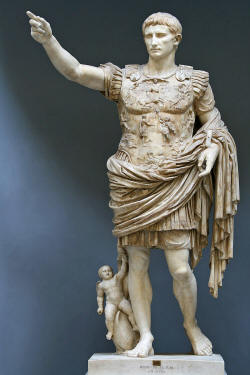

Queer Places:
Mausoleum of Augustus, Piazza Augusto Imperatore, 00186 Roma RM
 Caesar Augustus (23 September 63 BC – 19 August AD 14) was the first Roman emperor, reigning from 27 BC until his death in AD 14.[nb 1] His status as the founder of the Roman Principate (the first phase of the Roman Empire) has consolidated an enduring legacy as one of the most effective and controversial leaders in human history.[1][2]
Mark Antony charged that Octavian had earned his adoption by Julius Caesar through sexual
favors. Suetonius described Antony's accusation of an affair with Octavian as
political slander.
Caesar Augustus (23 September 63 BC – 19 August AD 14) was the first Roman emperor, reigning from 27 BC until his death in AD 14.[nb 1] His status as the founder of the Roman Principate (the first phase of the Roman Empire) has consolidated an enduring legacy as one of the most effective and controversial leaders in human history.[1][2]
Mark Antony charged that Octavian had earned his adoption by Julius Caesar through sexual
favors. Suetonius described Antony's accusation of an affair with Octavian as
political slander.
The reign of Augustus initiated an era of relative peace known as the Pax Romana. The Roman world was largely free from large-scale conflict for more than two centuries, despite continuous wars of imperial expansion on the Empire's frontiers and the year-long civil war known as the "Year of the Four Emperors" over the imperial succession. Augustus was born Gaius Octavius into an old and wealthy equestrian branch of the plebeian gens Octavia. His maternal great-uncle Julius Caesar was assassinated in 44 BC, and Octavius was named in Caesar's will as his adopted son and heir. Afterwards, Octavius took the name Gaius Julius Caesar and was called Octavianus. He, Mark Antony, and Marcus Lepidus formed the Second Triumvirate to defeat the assassins of Caesar. Following their victory at the Battle of Philippi (42 BC), the Triumvirate divided the Roman Republic among themselves and ruled as de facto dictators. The Triumvirate was eventually torn apart by the competing ambitions of its members; Lepidus was exiled in 36 BC, and Antony was defeated by Octavian at the Battle of Actium in 31 BC. After the demise of the Second Triumvirate, Augustus restored the outward façade of the free Republic, with governmental power vested in the Roman Senate, the executive magistrates, and the legislative assemblies. In reality, however, he retained his autocratic power—with the Senate granting him lifetime powers of supreme military command, tribune, and censor. Augustus rejected monarchical titles, and instead called himself Princeps Civitatis ("First Citizen"). Augustus dramatically enlarged the Empire, annexing Egypt, Dalmatia, Pannonia, Noricum, and Raetia, expanding possessions in Africa, and completing the conquest of Hispania, but suffered a major setback in Germania. Beyond the frontiers, he secured the Empire with a buffer region of client states and made peace with the Parthian Empire through diplomacy. He reformed the Roman system of taxation, developed networks of roads with an official courier system, established a standing army, established the Praetorian Guard, created official police and fire-fighting services for Rome, and rebuilt much of the city during his reign. Augustus died in AD 14 at the age of 75, probably from natural causes. Persistent rumors, substantiated somewhat by numerous deaths in the imperial family, have claimed his wife Livia poisoned him. He was succeeded as emperor by Livia's son - also his by adoption and former husband of his only biological daughter Julia - Tiberius, who consolidated the Principate into a de facto autocratic monarchy, the Roman Empire.
My published books: